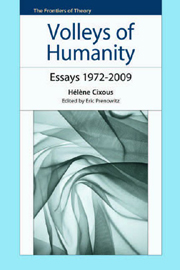Book contents
- Frontmatter
- Contents
- Sources
- Series Editor's Preface
- Introduction: Cixousian Gambols
- 1 Fiction and Its Phantoms: A Reading of Freud's Das Unheimliche (The ‘Uncanny’)
- 2 The Character of ‘Character’
- 3 Missexuality: Where Come I Play?
- 4 The Pleasure Reinciple or Paradox Lost
- 5 Reaching the Point of Wheat, or A Portrait of the Artist as a Maturing Woman
- 6 Letter to Zohra Drif
- 7 The Names of Oran
- 8 The Book as One of Its Own Characters
- 9 How Not to Speak of Algeria
- 10 The Oklahoma Nature Theater Is Recruiting
- 11 The Book I Don't Write
- 12 The Unforeseeable
- 13 Passion Michel Foucault
- 14 Promised Cities
- 15 Volleys of Humanity
- Acknowledgements
- Index
Introduction: Cixousian Gambols
Published online by Cambridge University Press: 12 September 2012
- Frontmatter
- Contents
- Sources
- Series Editor's Preface
- Introduction: Cixousian Gambols
- 1 Fiction and Its Phantoms: A Reading of Freud's Das Unheimliche (The ‘Uncanny’)
- 2 The Character of ‘Character’
- 3 Missexuality: Where Come I Play?
- 4 The Pleasure Reinciple or Paradox Lost
- 5 Reaching the Point of Wheat, or A Portrait of the Artist as a Maturing Woman
- 6 Letter to Zohra Drif
- 7 The Names of Oran
- 8 The Book as One of Its Own Characters
- 9 How Not to Speak of Algeria
- 10 The Oklahoma Nature Theater Is Recruiting
- 11 The Book I Don't Write
- 12 The Unforeseeable
- 13 Passion Michel Foucault
- 14 Promised Cities
- 15 Volleys of Humanity
- Acknowledgements
- Index
Summary
Towards the end of H. C. For Life, the first of his two books on Hélène Cixous, Jacques Derrida interrupts his reading with a reflection on her reception. He even assumes the role of a ‘prophet’, as he puts it, in order to ‘foresee’ or ‘predict’ what he calls ‘the place of this-life-this-work in History, with a capital H’. Derrida notes that the person and the work of Hélène Cixous ‘already have an incontestable legitimacy: a French, European and global renown’. But, he says, her authority in ‘the world of literature, of theatre, of politics, of so-called feminist theory, in the academic world, the old world and the new world and the third world’ should not be allowed to dissimulate ‘what remains to my eyes a ferocious misunderstanding and an implacable resistance to reading’.
Derrida proposes an extended analysis of these phenomena which, he insists, are multiple (he refers to them at one point as ‘resistances-misunderstandings’), and all the more intractable in that they affect not only political, philosophical, literary opponents of Cixous' work (notably in the form of what Derrida calls ‘the armed force of misogyny and phallogocentrism’), but also, most insidiously, those on the ‘inside’. One can resist something even as one supports it, Derrida notes.
In fact, Derrida diagnoses in his own reading relationship to Cixous a certain tireless resistance – dating back at least to the mid-1960s, when she gave him the manuscript of what would be her first book of fiction, published in 1967.
- Type
- Chapter
- Information
- Volleys of HumanityEssays 1972–2009, pp. 1 - 14Publisher: Edinburgh University PressPrint publication year: 2011



